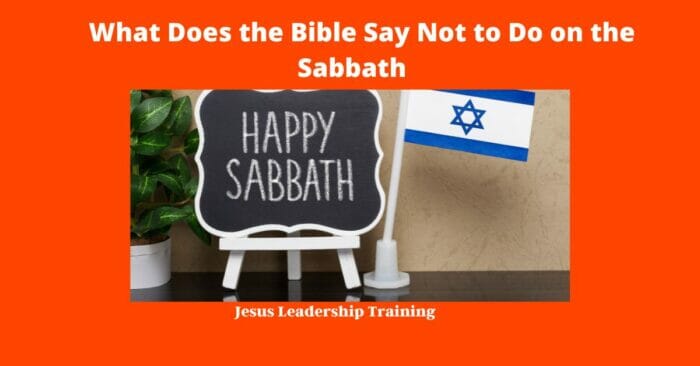What Does the Bible Say Not to Do on the Sabbath – The Bible makes it clear that the Sabbath is a day of rest and worship, and that there are certain activities that should not be done on this day. According to the Ten Commandments, the Sabbath is a day to be kept holy.
Exodus 20:8-11 states “Remember the Sabbath day, to keep it holy. Six days you shall labor and do all your work, but the seventh day is the Sabbath of the Lord your God. In it you shall do no work: you, nor your son, nor your daughter, nor your male servant, nor your female servant, nor your cattle, nor your stranger who is within your gates.” Scripture – This commandment clearly states that no work of any kind should be done on the Sabbath.
In addition, the Bible (Scripture) also provides several other activities that should not be done on the Sabbath in order to ensure that it is kept as a holy day. These activities include buying and selling, preparing food, lighting fires, and traveling. In essence, it is important to take the Sabbath day seriously and refrain from doing anything that would profane it.
Table of Contents
What Does the Bible Say Not to Do on the Sabbath
The Bible is a sacred text that is full of wisdom and guidance for all of us. It is filled with many commandments, instructions and laws that were meant to keep us safe and holy. One of the most important commandments is to keep the Sabbath day holy. The Sabbath is a day of rest and reflection, and it is to be observed on the seventh day of the week, which is Saturday, according to the Hebrew calendar. So, what does the Bible say not to do on the Sabbath?
The Bible is very clear about what should not be done on the Sabbath. The Sabbath is a day of rest set aside by God to be a holy day of worship and rest. Jesus said in Mark 2:27, “The Sabbath was made for man, not man for the Sabbath.” This means that the Sabbath is a day to be kept holy and to rest, not to be used for other activities.
- Working: The Bible states specifically, “You shall not do any work” on the Sabbath (Exodus 20:10). This includes any kind of work, whether it is physical or mental, related to one’s job, or even something that is normally done on the other days of the week.
- Cooking: In addition to not working, the Bible also prohibits cooking on the Sabbath (Exodus 16:23). This includes any kind of preparation of food such as baking, boiling, or roasting.
- Buying and Selling: The Bible also states that buying and selling should not be done on the Sabbath (Nehemiah 10:31). This includes any kind of exchange of goods or services for money.
- Carrying: The Bible also forbids carrying things from one place to another on the Sabbath (Exodus 16:29). This includes carrying things from one house to another or from one room to another.
- Planting and Gathering: Planting and gathering are also considered work and thus are prohibited on the Sabbath (Exodus 34:21). This includes planting seeds and gathering fruit or vegetables.
- Lighting Fires: Lighting fires is also considered work and is thus forbidden on the Sabbath (Exodus 35:3). This includes lighting a fire to cook food or to provide light.
- Doing Business: Doing business on the Sabbath is also prohibited (Jeremiah 17:21-22). This includes any kind of commercial activity, such as banking, trading, or investing.
- Punishing: Punishment is also forbidden on the Sabbath (Exodus 35:3). This includes any kind of physical or verbal punishment, such as scolding or spanking.
- Traveling: Traveling is also considered work and is thus forbidden on the Sabbath (Exodus 16:29). This includes any kind of journey, either on foot or in a vehicle.
- Entertaining: Entertaining is also considered work and is thus forbidden on the Sabbath (Exodus 35:2). This includes any kind of entertainment, such as playing games, listening to music, or watching movies.
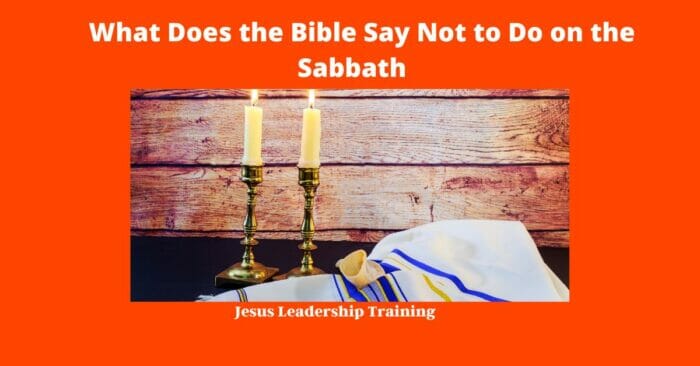
The Bible says in several places that you shall does not do work on the Sabbath. In Exodus 20:8-11, God commands that we should “Remember the Sabbath day, to keep it holy. Six days you shall labor and do all your work, but the seventh day is the Sabbath of the Lord your God. In it you shall do no work: you, nor your son, nor your daughter, nor your male servant, nor your female servant, nor your cattle, nor your stranger who is within your gates. For in six days the Lord made the heavens and the earth, the sea, and all that is in them, and rested the seventh day. Therefore the Lord blessed the Sabbath day and hallowed it.”
7 Bible Verses About the Sabbath
- Exodus 20:8-11 – This passage from the Ten Commandments specifically outlines the Lord’s instructions on how to observe the Sabbath day. It states that one should not do any work on the Sabbath, but instead dedicate the day to rest and holy worship.
- Isaiah 58:13 – This verse emphasizes that the Sabbath is a day of rest and not of business or work. It calls on believers to observe the Sabbath day and not do any form of labor on that day.
- Nehemiah 13:15-18 – This passage speaks of Nehemiah’s anger when he discovered that people in Jerusalem were doing business and other forms of work on the Sabbath day. He sternly rebuked them and warned them against desecrating the Sabbath day in this way.
- Jeremiah 17:21-22 – This passage condemns those who do business and work on the Sabbath day. It also warns against profaning the Sabbath with idle talk and vain pursuits.
- Amos 8:5 – In this verse, the Lord is angry with the people of Israel for turning the Sabbath day into a day for buying and selling. He promises to punish those who do such things on the Sabbath day.
- Ezekiel 20:13 – This passage speaks of the Lord’s displeasure with those who profane the Sabbath day. He promises to punish those who desecrate the Sabbath with labor or other activities.
- Isaiah 56:2-3 – This passage speaks of the Lord’s promise to bless those who observe the Sabbath day by dedicating it to rest and holy worship. It warns against doing any form of labor on the Sabbath day, as that is an abomination to the Lord.
The Sabbath was also commanded by God in the old testament. In Leviticus 23:3, it says, “Six days shall work be done, but the seventh day is the Sabbath of rest, a holy convocation. You shall do no work on it; it is the Sabbath of the LORD in all your dwellings.”
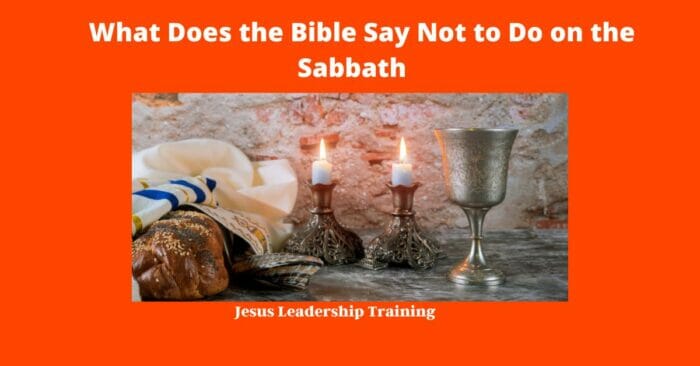
The Bible also tells us that nothing should be bought or sold on the Sabbath. (should not buy or sell anything on)In Nehemiah 13:15-17 it says, “In those days I saw in Judah some who tread wine presses on the Sabbath, and bring in sheaves, and load donkeys with grain, that they may bring it to Jerusalem on the day of the Sabbath; so I warned them against selling provisions on that day. Men of Tyre dwelt there also, who brought in fish and all kinds of goods, and sold them on the Sabbath to the children of Judah, and in Jerusalem.”
10 Hebrew Words Describing the Sabbath
- Melacha: A term used to refer to all forms of work on the Sabbath, including cooking, harvesting, and even lighting a fire.
- Chilul Shabbat: Translated as “desecration of the Sabbath”, this is an offense that is punishable by religious law. It includes activities such as carrying objects from one domain to another, or engaging in any type of labor on the Sabbath.
- Shabbat Shalom: A greeting used to wish someone a peaceful Sabbath.
- HaMotzi: A blessing that is said over bread before eating it on the Sabbath.
- Kiddush: The blessing that is said over wine or grapes before drinking them on the Sabbath.
- Techum Shabbat: The perimeter within which one must remain on the Sabbath. It is usually 2,000 cubits (about 1,000 meters) in each direction from the edge of the city.
- Shomer Shabbat: Someone who is especially careful to observe the Sabbath.
- Hilchot Shabbat: The laws and regulations concerning the Sabbath, as outlined in the Torah.
- Chazak U’Baruch: A blessing said at the end of the Sabbath that expresses gratitude for the day.
- Shavuot: One of the three pilgrimage festivals, this holiday celebrates the giving of the Torah. It is also known as the Feast of Weeks and is celebrated seven weeks after Passover.
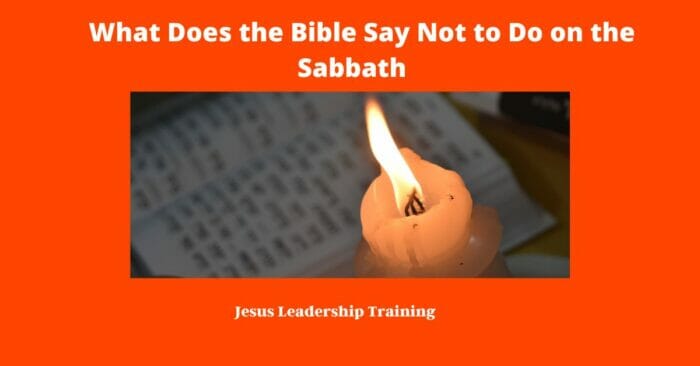
Finally, the Bible says in Hebrews 4:9-11 that “There remains, therefore, a rest for the people of God. For he who has entered His rest has himself also ceased from his works as God did from His. Let us, therefore, be diligent to enter that rest, lest anyone fall according to the same example of disobedience.” God does not want us to work on the Sabbath, but to enter His rest.
The Sabbath is a day to be kept holy and to rest. God commands us to do no work on the Sabbath and not to buy or sell anything on the Sabbath. Jesus said that the Sabbath was made for man, not man for the Sabbath. The Bible also tells us that we should enter into God’s rest on the Sabbath day. Seventh-Day Adventists follow the commandment to keep the Sabbath holy, and they believe that it is a day of rest, worship, and reflection. We can take a note from their example and make sure that we are honoring the Lord’s Day and His Sabbath rest.
What Does the Bible Say About God and the Sabbath?
The Bible says that God created the world in six days and rested on the seventh day. This is why the seventh day is called the Sabbath and is to be kept holy. The Bible also says that God blessed the seventh day and made it holy. This means that it is a day of rest and reflection and should not be used for work or labor.
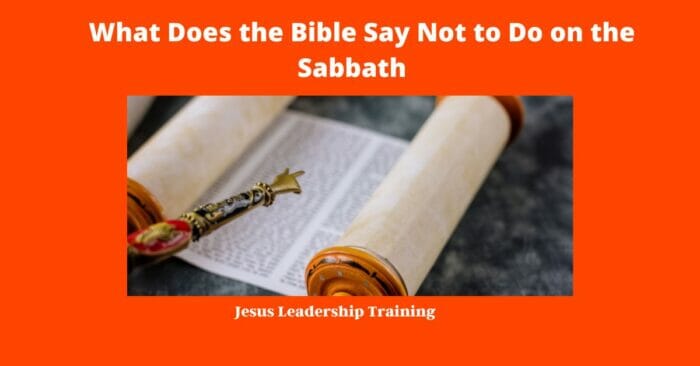
23 Items What Does Jewish Tradition say Not to Do on the Sabbath in Talmund and Midrash
- Refrain from Lighting a Fire: According to Talmud, lighting a fire on the Sabbath is forbidden, as it is considered a form of creative work.
- Refrain from Cooking or Baking: It is forbidden to cook or bake on the Sabbath, as it is considered a form of creative work.
- Refrain from Writing: Writing is considered a form of creative work and is therefore forbidden on the Sabbath.
- Refrain from Carrying Objects in Public Domain: Carrying objects in public domain is prohibited, as it is considered a form of carrying out labor.
- Refrain from Carrying Objects from Private to Private Domain: Carrying objects from private to private domain is also prohibited, as it is considered a form of carrying out labor.
- Refrain from Sewing or Knitting: Sewing and knitting are considered creative works and are forbidden on the Sabbath.
- Refrain from Doing Business: Doing business or activities involving buying and selling on the Sabbath is forbidden, as it is considered a form of creative work.
- Refrain from Planting or Cultivating: Planting or cultivating on the Sabbath is forbidden, as it is considered a form of creative work.
- Refrain from Building or Destroying: Building or destroying anything is considered a form of creative work and is forbidden on the Sabbath.
- Refrain from Erasing: Erasing is considered a form of creative work and is forbidden on the Sabbath.
- Refrain from Wearing Leather Shoes: Wearing leather shoes on the Sabbath is forbidden, as it is considered a form of creative work.
- Refrain from Tearing Clothes: Tearing clothes is considered a form of creative work and is forbidden on the Sabbath.
- Refrain from Engraving: Engraving is considered a form of creative work and is forbidden on the Sabbath.
- Refrain from Nailing: Nailing is considered a form of creative work and is forbidden on the Sabbath.
- Refrain from Hammering: Hammering is considered a form of creative work and is forbidden on the Sabbath.
- Refrain from Whitening: Whitening is considered a form of creative work and is forbidden on the Sabbath.
- Refrain from Carrying Objects from Private to Public Domain: Carrying objects from private to public domain is considered a form of labor and is forbidden on the Sabbath.
- Refrain from Measuring: Measuring is considered a form of creative work and is forbidden on the Sabbath.
- Refrain from Weighing: Weighing is considered a form of creative work and is forbidden on the Sabbath.
- Refrain from Grinding: Grinding is considered a form of creative work and is forbidden on the Sabbath.
- Refrain from Trapping Animals: Trapping animals is considered a form of creative work and is forbidden on the Sabbath.
- Refrain from Shearing Wool: Shearing wool is considered a form of creative work and is forbidden on the Sabbath.
- Refrain from Cutting Hair: Cutting hair is considered a form of creative work and is forbidden on the Sabbath.
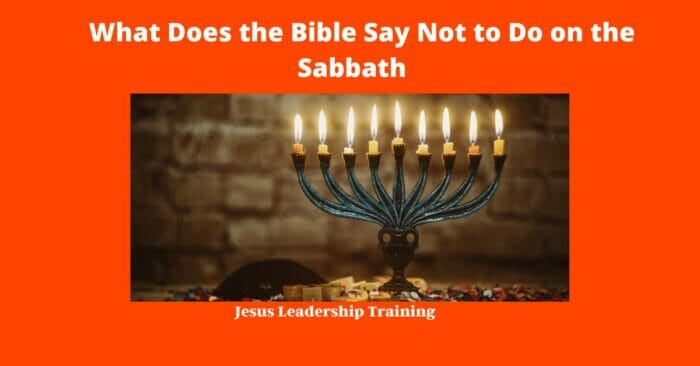
Jesus and the Sabbath: What Did Jesus Say About Keeping the Sabbath? Sabbath Rest
Jesus respected and followed the Sabbath, but He also taught that it is important to be flexible with the rules. Jesus was once accused of healing a man on the Sabbath. He responded by saying, “The Sabbath was made for man, not man for the Sabbath.” This means that we can be flexible with the rules of the Sabbath and honor it in our own way.
7 Greek Words Translated Sabbath
- Sabbatismos (σαββατισμός): This word appears four times in the New Testament, and it refers to the Sabbath day. It expresses the concept of resting from work on the Sabbath.
- Agnoeo (ἀγνοέω): This word appears twice in the New Testament, and it is translated as ‘ignoring’ or ‘forgetting’ the commands of God. It is used in several passages to describe what not to do on the Sabbath.
- Sunecho (συνέχω): This word appears twice in the New Testament, and it is translated as ‘to keep’ or ‘observe’ the Sabbath day. This is used in several passages to describe what not to do on the Sabbath.
- Chreia (χρεία): This word appears twice in the New Testament, and it is translated as ‘need’. It is used in several passages to describe what not to do on the Sabbath.
- Ephistemi (ἐφίστημι): This word appears twice in the New Testament, and it is translated as ‘to seek’. It is used in several passages to describe what not to do on the Sabbath.
- Timao (τιμάω): This word appears three times in the New Testament, and it is translated as ‘to honor’ or ‘to reverence’. It is used to describe what not to do on the Sabbath.
- Aschmatizo (ἀσχματίζω): This word appears twice in the New Testament, and it is translated as ‘to break’. It is used to describe what not to do on the Sabbath.
Biblical Teachings on the Sabbath: What Are the Rules?
The Bible clearly states that we should not do any type of work or labor on the Sabbath. This includes both physical labor (like mowing the lawn or washing the dishes) and mental labor (like doing homework or calculating finances). We are also supposed to abstain from buying and selling, gathering sticks, and kindling a fire.
The Importance of Resting on the Sabbath Day
The Bible emphasizes the importance of resting on the Sabbath. This is because it is a day of rest and reflection, and it is a time to be with God and to worship Him. The Bible says that the Sabbath is a sign between God and His people, and it is a reminder of His holiness and love for us.
How Does God’s Rest on the 7th Day Parallel the Jewish Sabbath
In Judaism, the observance of the Sabbath, or Shabbat, is one of the most important aspects of the faith. It’s the day when Jews take a break from the hustle and bustle of their everyday lives, to reflect on the teachings of their faith, and spend time with family and friends. But what is the origin of this religious tradition?
The Jewish Sabbath is believed to have originated from the Biblical story of God’s creation. In the book of Genesis, it is said that God created the world in six days, and on the seventh day, He rested. This is seen as a metaphor for the idea of taking breaks from work and dedicating some time for rest and reflection.
Bible Faiths that Observe the Sabbath
- Seventh-day Adventists: Th Seventh-day Adventist Church is a Protestant Christian denomination that observes the Sabbath on Saturday, the seventh day of the week. This denomination is one of the larges Christian denominations in the world, with over 18 million adherents. They practice a lifestyle that emphasizes health, education, and service to others, and the Sabbath is an important part of their spiritual practice.
- Jehovah’s Witnesses: Jehovah’s Witnesses are a Christian denomination that observe the Sabbath on Saturday. They believe in the literal interpretation of the Bible and place a strong emphasis on evangelism. They also adhere to a strict code of conduct, which includes the observance of the Sabbath.
- Judaism: Judaism is an ancient religion that believes in one God and observes the Sabbath on Saturday. Jews observe the Sabbath by abstaining from work activities and engaging in spiritual activities such as praying, studying scripture, and attending synagogue services.
- Seventh-Day Baptists: The Seventh-Day Baptist Church is a Christian denomination that follows the same beliefs as other Baptists, but observes the Sabbath on Saturday. They believe that the Sabbath is a day of rest, prayer, and reflection.
- Orthodox Christians: Orthodox Christians are a branch of Christianity that follows the traditional teachings of the Bible and observe the Sabbath on Saturday. They believe that the Sabbath is a day of rest and spiritual reflection.
- Messianic Jews: Messianic Jews are a religious group that combines elements of Judaism and Christianity, and observe the Sabbath on Saturday. They believe that Jesus Christ is the Messiah and that the Sabbath is a day of rest and worship.
- Seventh Day Pentecostals: Seventh Day Pentecostals are a Christian denomination that observe the Sabbath on Saturday. They believe that the Sabbath is a day of rest and worship, and that it is important to spend time with family, friends, and neighbors on this day.
The seventh day of the week, Saturday, is known as Shabbat in the Jewish faith, and is considered a day of rest and tranquility. All labor is prohibited on the Sabbath day; no one is allowed to work, cook, or even light a fire. Instead, people are encouraged to spend time with family, go to synagogue services, and reflect on the teachings of their faith.
List of Bible Faiths that Observe the Sunday as the Lord’s Day
- Christianity: Christians around the world observe Sunday as the Lord’s Day, starting with the celebration of the resurrection of Jesus Christ on Easter Sunday. This is a day of worship to celebrate the gift of salvation that Jesus gave to believers, and is typically spent in church services or other acts of devotion.
- Seventh-day Adventism: For Seventh-day Adventists, Sunday is still observed as a day of rest and worship, but Saturday is also a special day of worship. Seventh-day Adventists believe that God instituted the seventh day as a day of rest and worship at creation, and that it was changed to the first day of the week (Sunday) by the Roman Catholic Church in the fourth century.
- Messianic Judaism: Messianic Jews observe both Sunday and Saturday as days of rest and worship. They celebrate the weekly Sabbath on Saturday, and also celebrate Sunday as a day of joyous celebration and worship, honoring Jesus Christ as the risen Lord.
- Eastern Orthodoxy: The Eastern Orthodox Church observes Sunday as a day of rest and worship. This is the day of the resurrection of Jesus, when He rose from the dead and conquered death. Eastern Orthodoxy celebrates the resurrection of Jesus every Sunday, as well as on major feasts throughout the year.
- Lutheranism: Lutherans observe Sunday as a special day of worship, and it is traditionally referred to as the “Sabbath of the New Testament.” Sunday is a day to remember and celebrate the resurrection of Jesus, and to offer thanks for the gift of salvation.
The idea of a day of rest is not unique to the Jewish faith. Many other religions also have days of rest, such as the Islamic day of rest on Friday (which is called Jumu’ah) and the Christian day of rest on Sunday (the Lord’s Day).
The Jewish Sabbath is seen as a way of honoring the teachings of the Bible, while also providing a way for people to take a break from their everyday lives and spend time with the people they love. It is a reminder to appreciate the blessings that God has provided us, and to take a break from the hustle and bustle of life. Additionally, the Sabbath provides an opportunity for people to refocus on the spiritual aspect of their lives, and take a break from the materialistic aspects of life.
In conclusion, the Jewish Sabbath is a day of rest and reflection that is rooted in the story of God’s creation. It serves as a reminder for people to take a break from their busy lives, and spend time with the people they love. Additionally, it provides an opportunity to reflect on the teachings of the Bible, and appreciate the blessings of God.
How Should Christians Celebrate the Sabbath?
Christians should celebrate the Sabbath by taking time to rest and worship. This includes going to church, reading the Bible, praying, and spending time with family and friends. It is also important to take time to reflect on our lives and how we can be more like Jesus.
Why Did God Include the Sabbath in the 10 Commandments
Throughout the Bible, the Sabbath is seen as a day of rest and worship. It is a time to reflect on God’s mercy and to devote oneself to its service. In fact, the Sabbath commandment is the only one of the Ten Commandments that specifically mentions the Lord’s name. It is also the only commandment that includes both a positive and negative aspect. The positive aspect is that it is a day of rest, while the negative aspect is that it is a day to abstain from work.
The question of whether God included the Sabbath in the Ten Commandments has been a source of debate for many centuries. Some argue that the Sabbath commandment is not part of the Ten Commandments, because it does not include the same language as the other commandments. Others argue that the Sabbath commandment is a part of the Ten Commandments, because it is an important reminder of God’s presence and a source of spiritual and physical rest.
The debate over whether God included the Sabbath in the Ten Commandments will likely continue, but one thing is certain: the Sabbath commandment is an important part of the Christian faith. It is a reminder to take a day of rest and to remember God’s mercy. It is also a reminder to abstain from work and to devote oneself to its service. The Sabbath commandment is an important part of the Christian faith and is a reminder of God’s love for his people.
What Are the Consequences of Not Keeping the Sabbath?
The Bible does not specifically mention any punishments for not keeping the Sabbath, but it does say that we should honor the Sabbath and keep it holy. This means that if we ignore the Sabbath, we are not honoring God and His commandments.
What does the Bible say about Keeping the Sabbath in the New Testament?
The New Testament does not directly address the issue of keeping the Sabbath, but it does emphasize the importance of rest and worship. Jesus said that the Sabbath was made for man, not man for the Sabbath, which means that it is important to take time to rest and worship.
Why don’t we Keep the Sabbath Anymore?
Many Christians no longer observe the Sabbath in the same way that it was observed in the Bible. This is primarily due to changes in society and the way that we view work and rest. However, it is still important to take time to rest and worship, even if it is not on the traditional Sabbath day.
Is Working on the Sabbath a Sin?
The Bible does not specifically say that working on the Sabbath is a sin, but it does say that we should keep the Sabbath holy. This means that we should not do any type of labor or work on the Sabbath. However, some Christians may feel that it is ok to do light work on the Sabbath as long as they are still honoring God and taking time to rest and worship.
What Does the Bible say about the Sabbath Day?
The Bible says that the Sabbath is a day of rest and reflection and should be kept holy. It also says that we should not do any type of work or labor on the Sabbath, and we should take time to rest and worship.
Should Christians keep the Sabbath?
Many Christians today do not observe the Sabbath in the same way that it was done in the Bible. However, it is still important to take time to rest and worship, even if it is not on the traditional Sabbath day.
Sabbath day Rules in the Bible
The Bible states that the Sabbath is a day of rest and reflection and should be kept holy. It also says that we should not do any type of work or labor on the Sabbath, and we should take time to rest and worship.
How to Keep the Sabbath in Modern Times
In modern times, most Christians do not observe the Sabbath in the same way as it was observed in the Bible. However, there are still ways to honor the Sabbath and keep it holy. This includes taking time to rest, worship, and spend time with family and friends. It is also important to take time to reflect on our lives and how we can be more like Jesus.
Sabbath ( Saturday) vs Lord’ Day ( Sunday)
The Jewish Sabbath and the Christian Lord’s Day, Sunday, First Day of the Week, have many similarities, but also a few differences. In this blog, we will explore these similarities and differences in depth.
The Jewish Sabbath is an ancient tradition that dates back to the time of Moses and the Exodus from Egypt. It occurs on the seventh day of the week and is marked by a day of rest and worship. On the Sabbath, the Jewish people are instructed to abstain from doing any kind of labor, including cooking, traveling, or any kind of buying and selling. Instead, they are to use the time to focus on their faith and spend time with their family.
The Lord’s Day, Sunday, First Day of the Week, is a Christian tradition that also has ancient roots. It marks the day of the resurrection of Jesus Christ, and for this reason is often referred to as the “eighth day” of the week. On this day, Christians are instructed to gather for worship, for Bible study, and for fellowship. While some churches may still observe the traditional Sabbath, others may observe the Lord’s Day as the day of rest.
The two days have many similarities. Both are days of rest and worship, and both are observed as a day of thanksgiving to God. They also both have a focus on family time, as well as a time to reflect on spiritual matters.
However, there are a few key differences between the two days. The primary difference is the specific day of the week on which they are observed. While the Sabbath is observed on the seventh day of the week, the Lord’s Day is observed on the first day of the week. Another key difference is that the Sabbath is observed by Jews only, while the Lord’s Day is observed by Christians of all denominations.
In conclusion, the Jewish Sabbath and the Christian Lord’s Day, Sunday, First Day of the Week, share many similarities, but also have a few key differences. The similarities include a focus on rest and worship, and a time to spend with family and reflect on spiritual matters. The differences are primarily in the day of the week on which they are observed, and who observes them.
Final Thoughts – What Does the Bible Say Not to Do on the Sabbath
The Bible is full of commandments and instructions to help us live a holy life. One of the most important commandments is to keep the Sabbath day holy. This means that we should not do any type of work or labor on the Sabbath, and we should take time to rest and worship. The Bible also emphasizes the importance of rest and reflection, and it is important to take time to honor God and be with family and friends on the Sabbath.



